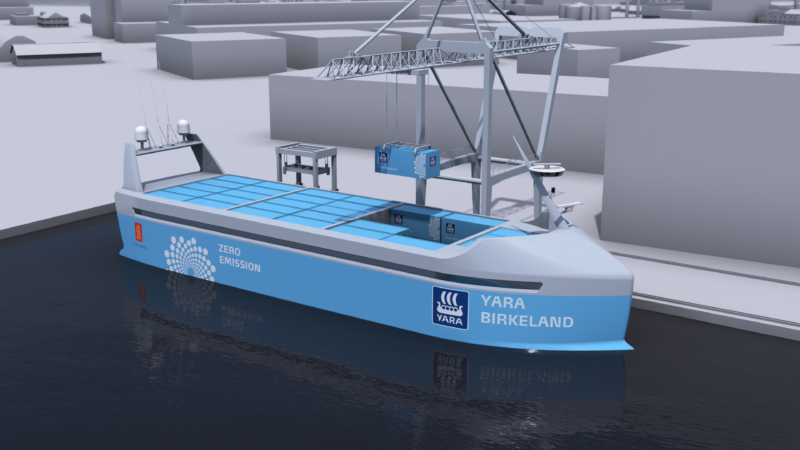
SpaceX's drone landing ships have already proven that uncrewed vessels can handle some of the most dangerous jobs at sea. Now, two Norwegian companies are poised to put robo-boats into one of the most dull: hauling cargo down the fjord.
Two Norwegian companies are teaming together to construct a short-range, all-electric coastal container ship that will eventually operate autonomously—eliminating up to 40,000 diesel truck trips per year. The ship, the Yara Birkeland, will begin operations in 2018 with a crew, but it's expected to operate largely autonomously (and crewless) by 2020 (regulatory clearance permitting, of course).
The $25 million Birkeland—described by some shipping executives as the "Tesla of the Seas"— is being jointly developed by the fertilizer company Yara and the maritime and defense technology firm Kongsberg Gruppen. The ship will initially be crewed from an on-board control center within a cargo container. Eventually, the container will be moved ashore, and the ship will be remotely operated. It will navigate autonomously by utilizing GPS and avoid collisions using a combination of sensors.
Birkeland will be a relatively small "feeder" cargo ship; its journeys will be short jaunts down a fjord on Norway's Baltic Sea coast from Yara's factory to a larger port. There, containers of fertilizer will be loaded onto larger seagoing ships for international transport. Currently, Yara ships these containers over land.
"Every day, more than 100 diesel truck journeys are needed to transport products from Yara's Porsgrunn plant to ports in Brevik and Larvik," Yara's president and CEO, Svein Tore Holsether, said in a statement issued by the two companies. "With this new autonomous battery-driven container vessel we move transport from road to sea and thereby reduce noise and dust emissions, improve the safety of local roads, and reduce nitrous oxide and CO2 emissions."
Petter Ostbo, Yara’s head of production, told The Wall Street Journal that the Birkeland is just the start. The company hopes to invest in larger autonomous ships for even longer routes and “maybe even move our fertilizer from Holland all the way to Brazil” when international regulations for crewless vessels are set.
Norway has invested significantly in autonomous ships, and it's moving rapidly toward allowing crewless shipping to ply its territorial waters. Kongsberg in particular has been involved in a number of projects pushing the art and science of drone ships forward—the company has developed a prototype autonomous offshore utility ship with Automated Ships Ltd (ASL), and it's working with ASL and the offshore oil rig supply company Bourbon Offshore to build an uncrewed oil rig support ship.
But long-range uncrewed merchant shipping remains uncharted territory. And the artificial intelligence algorithms required for fully autonomous trips—which would be required for trans-oceanic voyages with limited or questionable communications bandwidth—are still under development. It still may be some time before robots put merchant seamen out of work.
reader comments
121